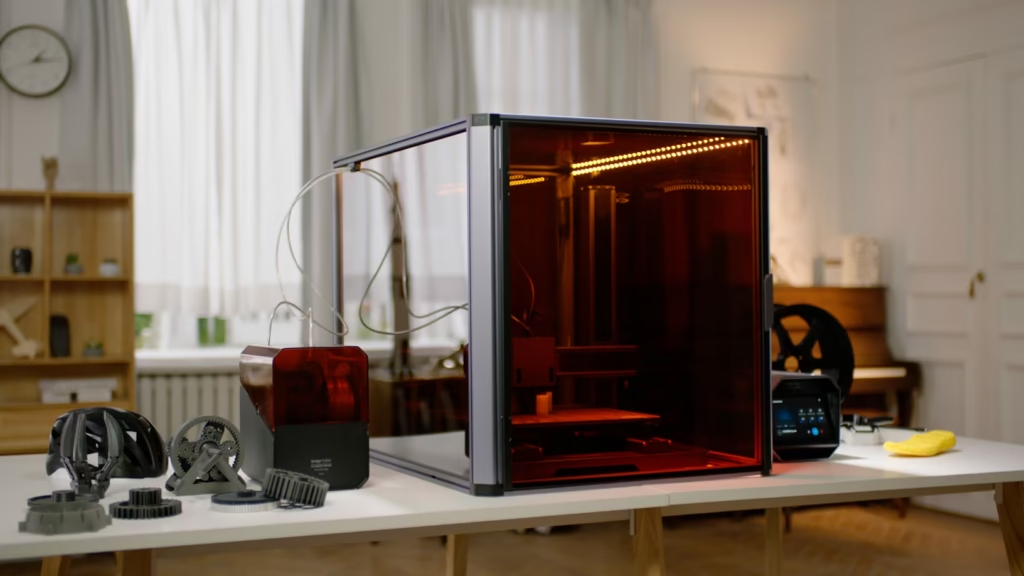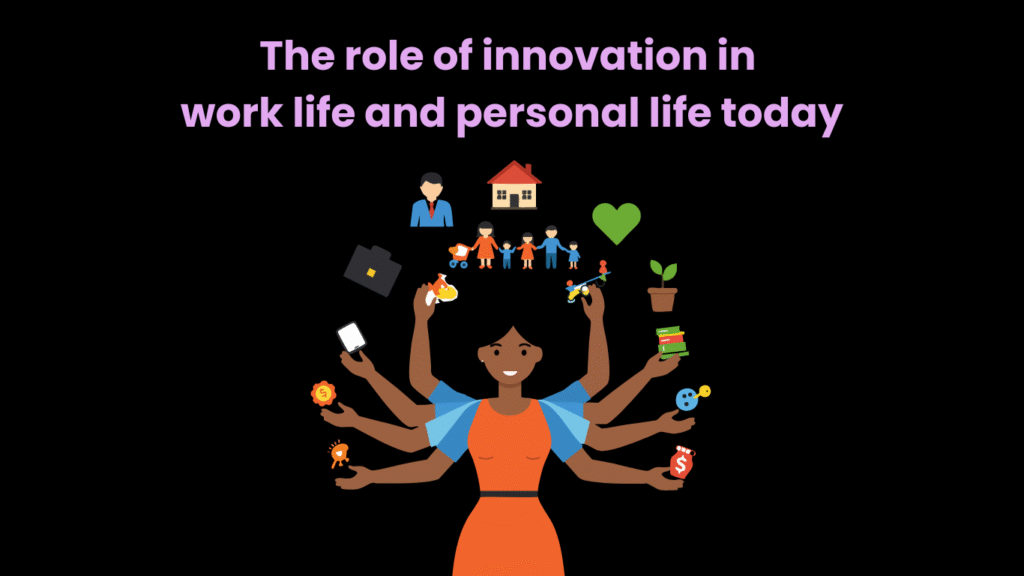In our personal life, innovation manifests in various forms—from smart home devices that automate chores to health apps that track our fitness goals. These tools not only make life easier but also promote healthier, more balanced lifestyles. Physical health, for example, has seen significant improvements through fitness trackers and telehealth services, which provide timely medical advice and monitor vital signs.
On the professional front, innovation is equally transformative. It empowers employees to achieve greater productivity, fosters creative problem-solving, and encourages continuous learning. The integration of digital tools and emerging trends in workplaces has redefined what it means to be efficient and effective.
As we delve deeper, you’ll discover how these innovative ideas and novel ideas and practices are shaping both our work and personal life, driving us toward a future where technology and human ingenuity go hand in hand.
How technology is changing the way we work

In today’s rapidly evolving landscape, digital technologies are enhancing productivity and efficiency across various sectors. Key points include:
- Remote work, once a rare perk, has become a standard practice for many businesses.
- 93% of companies have adapted their operational strategies in response to changing consumer demands due to the transition to remote work.
- The adoption of cloud-based collaboration tools has improved communication among remote teams, enhancing overall productivity.
One of the most significant benefits of this technological evolution is the improvement in work-life balance. Flexible work schedules are now more feasible, allowing employees to manage their professional and personal life more effectively. Innovative companies have recognized this trend and are integrating innovation to create an improved work-life balance for their employees.
AI recruiting tools and robotic assistants are transforming workplaces by streamlining hiring processes and automating repetitive tasks, allowing employees to focus on higher-value work that promotes growth and job fulfillment. Similarly, emerging tools such as the best ai avatar generator highlight how technology is not just about productivity but also about creativity, engagement, and personalization in the modern workplace.
Digital tools are not just about efficiency; they also play a crucial role in organizational innovation. Sophisticated security measures and training programs are essential as human error is responsible for approximately 88% of data breaches. Compliance with regulatory requirements is increasingly reliant on technology, which helps manage sensitive data securely.
Technological advancements in the workplace are constantly evolving, bringing new challenges and opportunities. Embracing innovation in the workplace encourages employees to explore new ideas and develop new skills, leading to professional growth and a more innovative work environment. Companies that foster innovation and empower employees to contribute their ideas often see increased employee well-being and business success.
Integrating these innovative practices into different departments helps create a cohesive company culture where employees feel valued and motivated to contribute to organizational growth. Leadership plays a crucial role in this, providing the necessary support and fostering an environment conducive to innovation.
By encouraging employees to embrace innovative thinking and participate in innovative projects, a company creates the opportunity to encourage employees to stay ahead of future trends and maintain a competitive advantage through employee ideas. This culture of innovation lies at the heart of business success, enabling organizations to adapt to market changes and capture new opportunities.
Creative tools that support modern communication
In today’s digital age, visuals and digital content have become central in how we communicate. Innovative software allows individuals to express creative ideas more clearly, fostering creative thinking and knowledge sharing. These tools not only enhance communication but also stimulate idea generation and creative solutions to tackle challenges in the workplace.
Digital tools like collaborative platforms and design software enable teams to work together seamlessly, regardless of physical distance. This encourages collaboration and fosters innovation, creating an innovative work environment where fresh ideas can flourish. Innovative companies leverage these tools to create a culture of workplace innovation, where employees are encouraged to think outside the box and contribute to innovative projects.
Creative tools also support professional skills development, allowing employees to acquire new skills and stay ahead of emerging trends. By embracing technological advancements, individuals can enhance their personal and professional growth and contribute to the organization’s success.
Innovative solutions in communication are essential for fostering a collaborative and innovative workplace. Encourage collaboration among employees to use these tools can lead to more effective knowledge sharing and cross-functional collaboration. This, in turn, empowers employees to take ownership of their contributions and feel valued within the organization.
As we continue to embrace innovation, the role of digital tools in communication will only grow, further enhancing our ability to connect, collaborate, and create. The future of work lies in our ability to leverage these tools to foster innovation and drive organizational growth.
Shifts in workplace culture with digital adoption

The integration of AI in workplaces is seen as a pivotal change comparable to the Industrial Revolution, with a potential of $4.4 trillion in productivity growth from corporate AI applications. This shift towards digital adoption has significantly impacted workplace culture, with employees now expecting flexible, digital-first work environments.
Automation, AI, and outsourcing are becoming increasingly prevalent in non-traditional industries, reshaping how work is done. Employees are generally more prepared to embrace AI in their roles than leaders perceive, often using AI tools more extensively in daily tasks. Millennials, who are the most familiar with AI, are in managerial positions and play a significant role in advocating for AI adoption within their teams.
Innovation is redefining leadership, collaboration, and team culture. A large portion of employees express a desire for more formal training in AI to enhance their proficiency and utilization of the technology. Trust in employers to act ethically in AI deployment is high, with 71 percent of employees believing their organizations will manage AI responsibly.
Leadership plays a crucial role in navigating the transition to AI by providing necessary support and fostering an environment conducive to digital collaboration. This includes encouraging employees to embrace innovative thinking and participate in innovative projects, which can lead to improved work-life balance and organizational growth.
As digital tools continue to evolve, so too will workplace culture. Organizations that prioritize innovation are better equipped to adapt to market changes and capture new opportunities. This culture of innovation not only differentiates businesses from competitors but also attracts and retains customers through unique offerings.
Fostering a culture to encourage innovation creates an environment where employees feel valued and motivated to contribute to organizational success. This, in turn, leads to long-term business success and a strong competitive advantage in the marketplace, fostering innovation.
The impact of innovation on industries outside technology

Innovation is not confined to the tech industry; it permeates various sectors, enhancing customer experiences and improving operational efficiency. Many non-tech companies are utilizing advanced technologies to stay competitive and meet consumer demands.
In healthcare, innovative solutions have revolutionized patient care. Telemedicine, for example, allows patients to consult with doctors remotely, reducing the need for physical visits and improving access to medical services. Retail giants like Nike and Coca-Cola have embraced technology to offer personalized products and services, showcasing innovation in traditional sectors.
The entertainment industry has also seen significant advancements. Disney’s implementation of MagicBands illustrates how tech can enhance visitor experiences by providing seamless access to attractions and personalized interactions. Unilever’s use of blockchain for supply chain transparency shows how tech can drive sustainability in consumer goods.
In agriculture, John Deere’s integration of AI is revolutionizing farming practices and resource management. This innovative approach helps farmers optimize crop yields and reduce waste, contributing to sustainable agriculture.
Patagonia exemplifies how innovative materials science can be combined with sustainable practices to enhance brand loyalty. By focusing on sustainable innovation, the company attracts environmentally conscious consumers and sets a benchmark for others in the industry.
Walmart’s adaptation to competition through service diversification illustrates resilience and strategic innovation. By embracing new technologies and business models, Walmart continues to thrive in a competitive market.
These examples highlight the broad impact of innovation across various industries, demonstrating that the innovation process is not limited to technology companies. By fostering a culture of innovation, organizations can stay ahead of emerging trends and maintain a competitive edge.
Outsourcing as a modern business strategy

Outsourcing has become a key trend in modern business strategies, offering numerous benefits such as cost savings, access to expertise, and global talent. This approach allows companies to focus on their core competencies while leveraging external resources to enhance operational efficiency.
One sector that has greatly benefited from construction outsourcing is the building and infrastructure industry. By delegating various aspects of construction projects to specialized service providers, companies can streamline operations, cut costs, and leverage expert skills. For instance, Outsourcey has played a pivotal role in transforming the construction landscape through innovative solutions and strategic outsourcing.
Outsourcing also fosters cross-functional collaboration and flexible work schedules, contributing to an innovative workplace environment. Integrating innovation into business models helps companies improve employee work-life balance and enhance overall organizational success.
Embracing outsourcing as part of a broader innovation strategy enables organizations to stay competitive and adapt to market changes. This approach not only drives business success but also empowers employees to contribute to the organization’s growth.
As businesses continue to evolve, outsourcing will remain a vital strategy for achieving long-term success and maintaining a strong competitive advantage in the marketplace.
Everyday services that make life easier
Innovation isn’t limited to the workplace; it also plays a significant role in our personal life. Everyday services have been transformed by innovative solutions, making life more convenient and efficient.
Global logistics companies like DHL have revolutionized the way individuals and businesses stay connected. With faster deliveries, tracking capabilities, and reliable services, these companies have set new standards for customer expectations. Service innovation in logistics has made it easier for people to receive goods quickly and efficiently, enhancing the overall customer experience.
The shift towards personal convenience is evident in various aspects of daily life. From food delivery services to ride-sharing apps, innovation has streamlined everyday tasks, allowing individuals to focus on more important activities. This improved work-life balance is a testament to the power of innovation in enhancing our personal life.
Embracing innovative practices and technologies allows service providers to meet the evolving needs of consumers. This commitment to strategic initiatives and innovation not only improves customer satisfaction but also drives long-term business success.
As we navigate the complexities of modern life, these everyday services play a crucial role in making our lives easier and more manageable. The future of service innovation lies in the continuous improvement of these solutions to meet the changing demands of consumers.
Technology in entertainment and lifestyle
Technology has significantly enhanced our entertainment and lifestyle, offering new ways to enjoy leisure activities and stay connected. Brands like Razer, Maxx, and M1 represent innovation in everyday consumer life, providing gadgets and services that cater to diverse needs.
Virtual reality (VR) is transforming entertainment by providing immersive experiences that increase guest engagement and loyalty. Augmented reality (AR) enriches visitor experiences by overlaying digital content onto real-world environments, such as interactive exhibits. These technologies offer unique and engaging experiences, blurring the lines between reality and the digital world.
The Internet of Things (IoT) is also making waves in the entertainment industry by automating operations and providing real-time analytics for better guest management. AI technologies are utilized to personalize guest interactions and streamline operations through predictive analytics.
Gamification strategies in entertainment venues involve rewarding guests for engagement, which can boost repeat visits and enhance enjoyment. These innovative approaches create a more engaging and enjoyable experience for consumers.
As we continue to embrace innovation, the balance between fun, productivity, and efficiency becomes more achievable. By leveraging new technologies, individuals can enhance their personal and professional lives, staying ahead of emerging trends and enjoying a more fulfilling lifestyle.
The future of entertainment and lifestyle lies in the continuous integration of innovative solutions that cater to the evolving needs of consumers. Embracing these technological advancements enhances our daily experiences, making life more connected and enjoyable.
Innovation in personal relationships and celebrations
Innovation is not just about business; it also enhances how we share love and celebrate special moments. Technological advancements enable real-time sharing of special moments, fostering emotional bonds even across great distances. Digital platforms allow couples to participate in experiences together, such as virtual events or online celebrations, enhancing their relationship.
For example, finding the perfect anniversary gift for her has become easier with e-commerce and digital tools. These platforms offer a wide range of thoughtful presents, making it simple to find something special and meaningful. This convenience highlights how innovation can bring joy and convenience to our personal life.
Building connections with individuals from different backgrounds enhances empathy and broadens perspectives. Celebrating differences among individuals fosters a stronger sense of community and connection. Experiences in diverse settings, such as schools and sports, provide valuable insights that allow children to learn about and appreciate various life circumstances. These valuable insights contribute to their overall development.
Creating inclusive environments for celebrations helps recognize and honor the achievements of all participants, regardless of their challenges. Emerging technologies like Virtual Reality are set to provide immersive experiences that can deepen connections between individuals despite physical separation.
Online communities and resources offer support and guidance for individuals navigating modern relationship complexities. Setting digital boundaries can help maintain the quality of face-to-face interactions and enhance personal relationships.
Embracing innovative solutions in our personal projects fosters more meaningful connections and a greater sense of community. These advancements not only make life more convenient but also enhance our emotional well-being and personal growth.
Read More: Best Events Management Software for Coworking Spaces
Summary
Innovation is a driving force that impacts both our professional and personal life. In the workplace, it enhances productivity, fosters a culture of creativity, and improves overall well-being. Remote work, AI tools, and digital collaboration platforms have revolutionized how we work, making it more flexible and efficient.
In our personal life, innovation simplifies everyday tasks and enhances our physical health. From smart home devices to health apps, these tools promote healthier, more balanced lifestyles. Innovation also enhances our personal relationships and celebrations, making it easier to share love and special moments with others.
By embracing innovation, we can achieve both personal and professional growth. It’s not just about cutting-edge technology but about small, meaningful changes that make life smoother and more enjoyable. As we continue to navigate the complexities of modern life, staying open to new ideas and technologies will be key to achieving long-term success and fulfillment.
Let’s embrace innovation and make the most of the opportunities it presents. By doing so, we can create a better, more connected, and more enjoyable life for ourselves and those around us.
Frequently Asked Questions
How does innovation impact work-life balance?
Innovation positively impacts work-life balance by introducing tools that boost productivity and offer greater flexibility, allowing you to seamlessly integrate your work and personal life. Embrace these advancements to create a more harmonious balance!
What are some examples of creative tools that support modern communication?
Creative tools such as design software, collaborative platforms, and digital content creators not only enhance your communication but also empower you to express ideas more clearly and work together more effectively. Embrace these tools to amplify your message and teamwork!
How has innovation impacted industries outside of technology?
Innovation has significantly transformed industries like healthcare, retail, and education by enhancing customer experiences and operational efficiency. Embracing these advancements, such as telemedicine and personalized products, can propel any industry forward!
Why is outsourcing considered a modern business strategy?
Outsourcing is a powerful modern business strategy that drives cost savings and taps into global expertise, enabling companies to concentrate on what they do best. Embrace outsourcing to elevate your operational efficiency and unlock new growth opportunities!
How does innovation enhance personal relationships and celebrations?
Innovation strengthens personal relationships and celebrations by fostering real-time sharing of special moments and creating digital platforms for virtual gatherings. Embrace these advancements to stay connected and celebrate meaningful experiences, no matter the distance!




